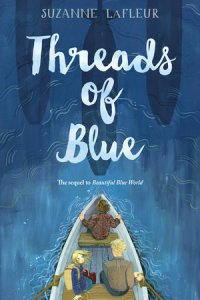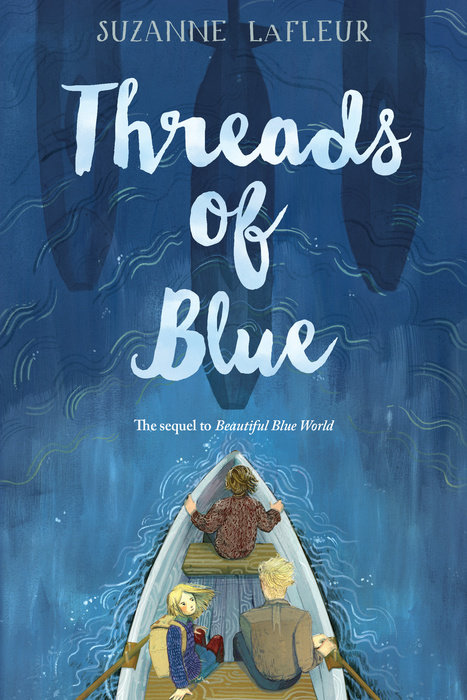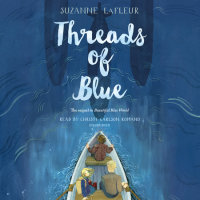Threads of Blue
The thrilling sequel to the acclaimed Beautiful Blue World follows a brave girl who must flee her country during wartime and work undercover to defeat the enemy. For fans of The War That Saved My Life and Wolf Hollow.
“A thoughtful, pellucid story . . . [that] gently probes questions of loyalty, patriotism and sacrifice.” —The Wall Street Journal on Beautiful Blue World
A war took Mathilde away from her family when she was chosen to serve her country, Sofarende, with other children working on a secret military project.
But now the other children—including her best friend, Megs—have fled to safety, and Mathilde is all alone, determined to complete her mission.
In this powerful and deeply moving sequel to the acclaimed Beautiful Blue World, Mathilde must make her way through a new stage of the war. Haunted by the bold choice she made on the night she chose her country’s future over her own well-being, she clings to the promise Megs made long ago: “Whatever happens, I’ll be with you.”
Praise for Threads of Blue:
Bank Street Best Children’s Books of the Year
"Mathilde is unforgettable . . . ever vulnerable, brave, headstrong, compassionate, confused, and always trying to hold on to the values she holds dear. . . . Deeply moving and powerful." --Kirkus Reviews, Starred
"Beautifully written . . . a tale about the ravages of war and survival, starring an unforgettable heroine." --SLJ, Starred
"A story of keen insight and unflinching grace, bright with hope." --Booklist, Starred
An Excerpt fromThreads of Blue
1
The sky stretched above me, pale with streaks of pink.
Beautiful.
But where was our ceiling? Had my house been blown open in the night?
Or was I dead, and this was what was next? Did our souls really rise up when our bodies went into the ground? To sway in the sky?
Because my bed lifted and sank, lifted and sank.
I must be sick.
Why didn’t Mother come to feel my forehead, to check my fever, to cool me?
My sisters cried, sharp and piercing. Poor Kammi and Tye must have been sick, too.
Where was Mother? Father? Didn’t they hear us? Why didn’t they come?
“I’ll help you,” I tried to tell Kammi and Tye. I reached out my hand from under the blankets.
No, one wasn’t a blanket, it was my coat. That was right, it had been a bombing night. I’d slept under my coat. The other was a blanket, but not my own. It was gray-blue, woolen, heavy, and damp. It smelled fishy, like the sea.
The sea, the sea . . .
The sea . . .
The sea!
Gulls cried above us.
Not my sisters.
The boat’s motors slowed.
Land ahead.
“Are you feeling better?” the fisherman asked.
Had I been sick, then? “Better?”
“Rough night. After it got choppy you lay down, clutching your stomach.”
It was better knowing that Mother wasn’t here. Better than having called and called her when I was sick, to have her ignore me and Kammi and Tye, when we needed her. She wouldn’t do that.
“I feel okay. That’s Eilean?”
“It is.”
My stomach gave another awful swoop.
I had never been to Eilean. I would set foot in a new country for the first time.
Alone.
But Megs, my best friend, would be there. She had set out ahead of me. We would find each other. She had said she would be with me, whatever happened. I was the one who’d fallen behind, but I’d promised to catch up.
Megs?
Megs?
I called for her in my heart, like we’d practiced.
It had worked one time in the past, our silent way of reaching for each other.
But there was no answer.
My fault.
I sat up. I felt better looking over the edge of the boat--watching the deep blue water rock and sway made it feel more natural for my body to be doing it, too.
“What are you meant to do in Eilean?” the fisherman asked.
I watched the waves for another moment, gently biting my lip.
“I don’t know. I was just told to get there.”
I was sorry I couldn’t tell him more. He had shuttled me across the water overnight at a moment’s notice. Could I say that the Tyssia-Erobern Empire was about to occupy Sofarende?
I knew that our country was far behind us, but its absence from the horizon made a lump rise in my throat.
As if Sofarende already were no more.
I might not be welcome back there anyway, not ever again, if anyone had figured out what I’d done.
“You should stay when we get to Eilean,” I said, the most I could hint.
“I’ve got two little ones at home. They’re probably worried because I didn’t come back last night.”
A boy and a girl, faces pressed against their front window, waiting for their father. Their mother, even more anxious, pretending she wasn’t, hovering nearby.
I sat back and drew my knees up to my chest.
“I’m sorry. It’s my fault you didn’t go home.” We should have taken the time to get his family. I hadn’t thought.
“Not at all. Orders are orders.”
“How did you stay out of the military?” I asked. Most men his age had been called up to serve.
“Twisted leg. My foot turns the wrong way. No good for marching. But just fine in a boat. My arms are strong, I can cast out my net and pull it back in. . . . How did you get in it?”
“Didn’t they have the test in your town?”
“What test?”
Maybe they hadn’t. Or maybe he hadn’t paid attention because his own children were too young. “The Army Adolescent Aptitude Test. For children who wanted to serve.” If you’d passed the test, you had to spend the rest of the war in the army. But they’d taken us from the bombed cities, kept us safe and fed. It was what my parents had hoped for.
“What are you, twelve years old?”
“Almost thirteen.” I tightened my arms around my knees, pulling them to my chest.
“What is the world coming to?”
Did anyone know?
I raised my eyes to the sky. Still no aerials.
“Are there dybnauts out here?” On land, I feared attack from the sky; on the sea, should I look into the depths below, for the deep-undersea boats? The public believed that Tyssia had no access to the sea, but at Faetre, the manor house full of war secrets where we who’d passed the test had worked, my friend Annevi had told me otherwise.
“In the night I saw plenty of Sofarender and Eilean ships headed in the same direction as us. All sizes. What’s going on?”
I bit my lip again. “You should pick up your children and come back.”
“I don’t have permits to land in Eilean.”
“Wait--you--?”
“Calm down. You do. Your yellow transit card is pretty powerful.”
“But if you can’t land--”
“You’ll swim.”
“Swim! I--I can’t!”
“A Sofarender who can’t swim?”
“I’m from the south, not the coast--I--”
“They didn’t teach you that in your training?”
“I didn’t have any kind of training.”
Unfortunately.
The fisherman shook his head in amused disbelief. First they take children into the army, then they provide them with no training whatsoever.
I had no good answers for him. It had seemed like our proctors had cared for us. Had maybe saved our lives by taking us.
Now that it was lighter out, I could see that the fisherman’s stubble had grown in overnight. His wife was probably looking over his razor and other shaving things. Doesn’t he need them? Will he ever come back to use them?
There was still time for them to be reunited before Tyssia got to the northern port towns, wasn’t there?
“Don’t worry,” the fisherman said. “I’ll send you with a buoy.”
He didn’t mean don’t worry about his family. He meant don’t worry about him pitching me into the sea.
“Won’t my card allow you to dock the boat just to let me out?”
“Going to let you out near a beach. I’ve headed farther west to get away from the other ships and boats. I don’t know about any docks. I’ll cut the engines entirely as we get into shallow water.”
“I can’t get all wet.”
“Of course you can get wet.”
“No, it’s not me, it’s . . .”
I drew my coat closer. The fisherman studied its thick bulk. Too thick for the season, too padded for the wartime scarcity of fabric. Stuffed full of the documents I’d been asked to bring.
“Heaven above.” He raised his eyes up. Then he looked back down at me. “Whatever you’ve got on you, it will dry out. And if not, I was under the impression that the most important thing was to get your feet on that damp Eilean soil, isn’t it?”
That, I was not sure of. Not anymore.
I stared out at the water, at Eilean’s coast growing as we neared. The shoreline alternated between cliffs and short beaches.
We were more to the Examiner and her team than just transporters, weren’t we? She had picked us for our minds. She cared about us as people.
Didn’t she?
The fisherman cut the engines, leaving us bobbing several hundred yards from the sand.
A peaceful, quiet, empty place.
How could there be such a war?
The fisherman stood and came over to me, arms outstretched to help me put my coat back on, the way I imagined he helped his children into their coats when it was time for school.
Father had always helped us into our coats like that, too.
The lump returned to my throat.
“Button up good,” the fisherman instructed. As I did, he removed his belt, looped it around my middle, and cinched it tight.
“That should keep the whatever-it-is in place.”
“Thanks.”
Then he handed me what looked like a large pretend pastry, but it was hard.
“What is this?”
“It floats. Hug it tight to your chest. There, like that.” He looped a rope through the hole in its center, double- and triple-knotted it. The rope looked thin, but I hoped it was strong.
I took a deep breath, looking over my shoulder at the water.
“I’ll pull you back in if things look bad. Face the shore at a diagonal, kick, and you can maybe ride in on the waves if the pull is right.”
The extent of my swimming lesson.
He gave me a big smile.
I tried to smile back, but my stomach churned like the choppy water.
“Good luck, Mathilde.”
“Thank you,” I said, as sincerely as I could. “I’ll never forget what you did for me.” I hope you get back to your family.
Were there Tyssian dybnauts, waiting to get him on the way back?
Waiting for me?
I looked over the side of the boat.
Cold! Cold! Cold!
I drew in my breath. My mouth flooded with the icy sea.
Salt!
I struggled to get my head above the water. Choking, my body remembered the instructions: my arms held tight to the floating pastry; my legs kicked.
I broke the surface. The fisherman yelled, “That’s it! That’s it!” My head didn’t go back under again.
My eyes stung, but I fixed them on Eilean and kicked and kicked.
When I relaxed, the water lifted me, up and down, up and down, as it had lifted the boat.
And that was how I was borne by the sea onto the shore of Eilean.
I landed, flat on my stomach, face in the sand. I spat and blinked.
I tried to catch my breath as the pastry bobbed all the way back to the fisherman. When it reached him, he wound the rope up around it.
My cord to Sofarende was cut.
I could not go back.
And probably shouldn’t, as the last thing I’d done before I left was commit treason.
The fisherman raised his hand in a long, still wave. I stood and raised mine, held it high, so he could see me wave back, so that he would know I was all right, that he had succeeded, though my arms were shaking from gripping the pastry so tight.
Would he make it back to Sofarende?
Would it still be there?
Were there dybnauts lurking, making the way back dangerous?
Please let him be safe on the way back. Please don’t let anything happen to him because he helped me.
I had done it. I had made it to Eilean.
I plopped back down onto the sand, breathing hard.
I looked up and down the beach.
Disappointment rippled through me.
Megs wasn’t there, waving in welcome.
No one was on the beach at all.
I stood and peeled off layer after layer of wet clothing until I was standing in my underthings. I spread out the nightclothes I hadn’t taken off in days. I reached into my coat’s inside pocket. The landing card and IDs were okay--wet, but readable. The sopping clump of papers . . . how much trouble would I be in for ruining them? Documents so precious, they would use a child to smuggle them across international borders during wartime.
The text was typed and had survived the water, but the words looked like gibberish. Coded. Or cyphered. Smart. Caelyn or Brid could have started marking them for patterns, but they probably couldn’t have read them, even though coded, typed pages were their specialty at Faetre. Maybe Tommy or Hamlin could. They were geniuses.
I set the papers out to dry, weighing each down with rocks.
They would be a crinkly, sandy mess.
When she saw them, the Examiner would say, “Did you swim to Eilean?”
And I would say yes.
The wind tugged at the papers, trying to set them free.
If I lost them . . .
One got loose. I hurried after it, shouting, “Wait!”
Not that the page could hear me.
I caught up with it, panting.
Holding the paper tightly, I took in which one it was.
Not a secret document.
Something more precious.
My sisters’ handprints.
Little Tye’s. And Kammi’s. With mine.
The paint had held up well. The water hadn’t ruined the images.
I sat down, holding the paper tightly as the wind threatened to whisk it from my grasp.
I took the risk of letting go on one side to press my right hand over my own right handprint.
My hand was slightly bigger than the print.
I had grown.
It had only been a few months, but I had grown.
Had they grown, too?
My stomach clenched.
Already, their hands wouldn’t match the ones on this paper. Their hair would be longer. Tye’s baby-plump cheeks would be thinner.
But I hoped so. Of course I did. Even if it meant we would one day meet each other and feel like strangers, I wanted them to grow.
Because if they weren’t growing . . .
Where were they? Still at home? Still with Mother and Father? Had our family been torn apart even further since my parents had sent me to Faetre?
Did they know the danger that every Sofarender was in?
Were they hurt or scared?
I weighed the paper down.
And then I took both my hands and pressed them firmly into the sand, making my mark on this land.
2
I woke again to a stretch of sky, this time of hazy sunshine.
The sea broke on the shore nearby, no longer rocking me. My stomach was less queasy, but it grumbled.
I sat up.
I felt damp, though not quite as cold, except for my toes, icy in the moist sand. Did they look a bit purple? I rubbed each foot quickly with my hands.
My clothes would never dry on the beach. I pulled on my nightgown, my socks. My shoes squished when I shoved in my feet.
The papers were no longer soaked, but they were still droopy. They wouldn’t be able to dry properly, either. I freed them from under the rocks and collected them in a stack, and carefully folded up my sisters’ handprints. Then I sat, studying another page covered in paint.
All blue paint.
Rainer’s picture of the things that made him happiest. Of home. When it had been his home. The picture that showed both of us what the world could be when it was perfect, when people cared about each other, whoever they were. The picture--the vision--he had entrusted to me when I’d helped him escape.


